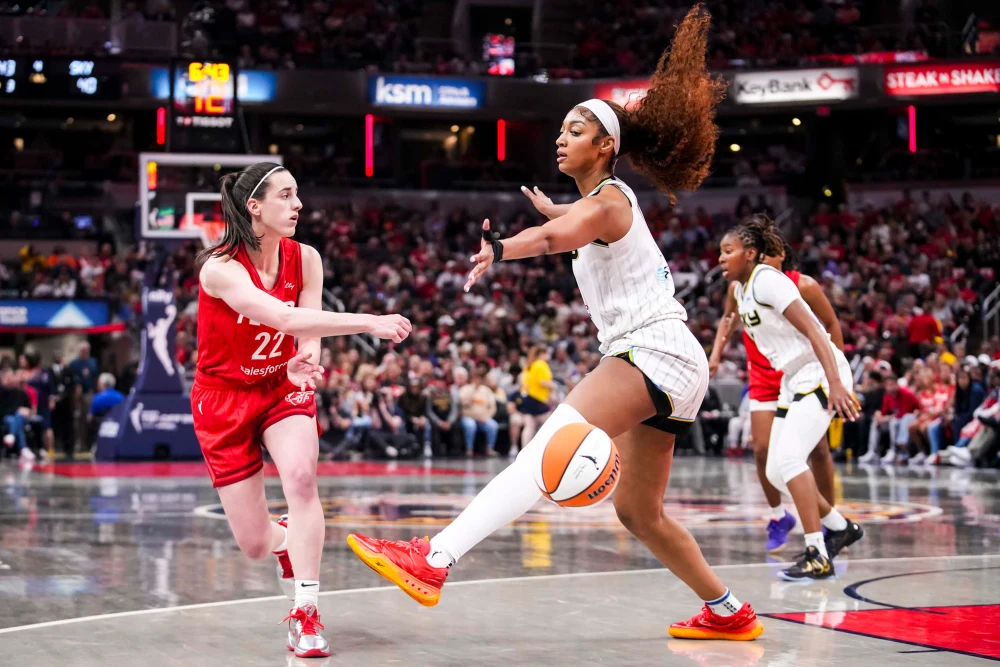The Women’s National Basketball Association (WNBA) recently addressed a troubling controversy that arose following the game between the Chicago Sky and the Indiana Fever. Reports surfaced alleging that fans attending the matchup had made racist remarks, sparking immediate concern and prompting calls for swift investigation. However, after a thorough review of the incident, the league has publicly stated that it cannot substantiate the claims regarding racist fan behavior during the game. This announcement has led to mixed reactions across the WNBA community and the wider sports world, highlighting the ongoing challenges leagues face in confronting and managing allegations of discrimination and harassment at live sporting events.
The initial claims came from players and attendees who reported hearing or witnessing racist language directed at individuals during the game. Given the WNBA’s longstanding commitment to social justice and equality—values that have been integral to its identity—the accusations struck a nerve not just within the league, but also among fans and advocates who watch closely for signs of intolerance in professional sports environments. The league took these reports seriously, immediately launching an internal investigation to determine the veracity of the allegations and to understand the full context of what had occurred during the intense rivalry game.
The investigation involved reviewing available video footage from the arena, interviewing game officials, security personnel, players, and select fans who were in the vicinity of the alleged incidents. The WNBA also engaged independent observers and worked alongside arena staff to ascertain whether any inappropriate behavior took place that violated league policies or could contribute to a hostile environment. Despite these extensive efforts, the league announced that there was insufficient evidence to confirm that racist remarks were made by fans at the event.
In a statement released by the WNBA, league representatives expressed their continued commitment to providing a safe and respectful environment for players, fans, and staff. The statement acknowledged the sensitivity of the issue and affirmed that while the claims could not be substantiated through the investigation, the league remains vigilant and proactive in preventing and addressing any form of discrimination or harassment. The WNBA reiterated that any credible reports of misconduct will be thoroughly investigated and that appropriate actions will be taken if violations are found.
The announcement has sparked discussion on several fronts. Supporters of the league’s decision to maintain an evidence-based approach have praised the thoroughness of the investigation and the importance of not rushing to judgment without clear proof. They argue that false or unsubstantiated allegations can unfairly damage reputations and distract from genuine efforts to combat racism in sports. Conversely, some advocates and members of the community have expressed frustration, feeling that the league’s findings might overlook the lived experiences of those who reported feeling targeted or uncomfortable. This tension underscores the complexity of addressing allegations of discrimination in highly charged environments where emotions run high and where the perception of wrongdoing can be as impactful as its reality.
The WNBA has historically been proactive in confronting social issues, often using its platform to amplify messages of equality, justice, and inclusion. Players, coaches, and league officials have frequently spoken out on matters ranging from racial justice to LGBTQ+ rights, and the league has implemented policies to support a diverse and inclusive culture. This commitment is reflected in community outreach programs, partnerships with social justice organizations, and initiatives designed to educate fans and staff about respectful conduct. The recent investigation into the Sky-Fever game fits within this broader framework of accountability and transparency that the league strives to maintain.
One of the challenges the WNBA—and professional sports leagues in general—face when dealing with allegations of racist remarks or behavior is the difficulty of capturing and documenting such incidents in real-time. Unlike more tangible violations such as physical altercations or rule infractions on the court, verbal harassment often happens quickly, can be difficult to verify, and may be missed by cameras or officials. Moreover, the large and diverse nature of live audiences means that behavior can vary widely, and isolated incidents might go unnoticed or unreported. These factors complicate efforts to police fan behavior and ensure that stadiums remain safe spaces for all attendees.
In response to these challenges, many leagues, including the WNBA, have taken steps to increase security, enhance training for staff on recognizing and responding to discriminatory behavior, and improve reporting mechanisms for fans and players. Some arenas have also adopted codes of conduct that explicitly prohibit harassment or hate speech, with penalties that include ejection from the venue or bans from future events. The goal is to create an environment where all fans can enjoy the game free from intimidation or hostility, and where players feel supported and protected from off-court abuse.
Despite the WNBA’s inability to substantiate the specific claims from the Sky-Fever game, the situation has reignited conversations about the broader culture of sports fandom and the responsibility of leagues to proactively combat racism. It serves as a reminder that vigilance is necessary not only in responding to reported incidents but also in fostering an overall atmosphere of respect and inclusion. Many observers emphasize that creating lasting change requires ongoing education, community engagement, and clear consequences for unacceptable behavior.
The incident also highlights the role that players themselves play in advocating for change. WNBA athletes are known for their leadership both on and off the court, often speaking candidly about social justice issues and using their visibility to push for progress. Their voices are instrumental in raising awareness and encouraging fans and organizations to take discrimination seriously. When players report feeling targeted or uncomfortable due to fan behavior, it sends a powerful message about the importance of vigilance and the need for effective safeguards.
As the WNBA moves forward from this episode, it remains focused on upholding its standards and values. The league’s handling of the Sky-Fever incident demonstrates a commitment to due process and transparency, balancing the need to address serious allegations with the importance of evidence-based conclusions. While this particular investigation did not confirm the presence of racist remarks from fans, it has underscored the ongoing work required to build and maintain an inclusive and welcoming environment at all WNBA games.
Looking ahead, the WNBA is likely to continue refining its policies and procedures around fan conduct, ensuring that any reports of discrimination are met with prompt and thorough attention. This includes improving the tools available for reporting incidents, increasing training for arena staff, and fostering partnerships with advocacy groups to support education and prevention efforts. The league’s broader social justice initiatives will also remain central to its identity and mission, reinforcing the message that racism and intolerance have no place in the sport.
In conclusion, the WNBA’s announcement that it cannot substantiate claims of racist fan remarks at the Sky-Fever game reflects the complexities inherent in investigating such allegations. It also reaffirms the league’s commitment to fairness, safety, and respect for all participants and spectators. While this specific investigation did not validate the reported misconduct, it serves as a catalyst for ongoing dialogue and action to ensure that the WNBA continues to be a leader in promoting equality and combating discrimination within professional sports and beyond.



